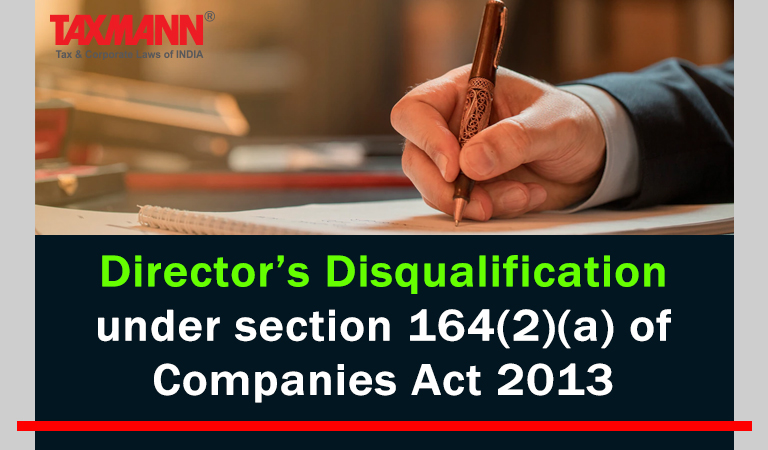Director’s Disqualification under section 164(2)(a) of Companies Act 2013
- Blog|News|Company Law|
- 2 Min Read
- By Taxmann
- |
- Last Updated on 25 April, 2022

[2022] 137 taxmann.com 363 (Article)
Section 29A of the Insolvency and Bankruptcy Code, 2016(“IBC” or “Code”) states out the list of persons who as per the code are ineligible to submit the resolution plan. The said section was added in the Code vide IBC (Second Amendment) Act, 2018 (no. 22 of 2018), w.e.f. 06-06-2018. As per the statement of objects and reasons annexed to the IBC (Amendment) Bill, 2018, the said section was introduced in the code to bar the persons who by their misconduct had contributed to the defaults of the corporate debtor and or are otherwise undesirable from submitting a resolution plan for the corporate debtor. The section mentions nine disqualification criteria in total. Further, the resolution applicant is not barred merely because he falls under any of the disqualifications but even his partners who submit resolution plan with him as member of consortium or otherwise should also not attract the bar under Section 29A. Furthermore, as per Section 29A (j), the said disqualifications under Section 29A shall also not be attracted by the connected persons of the resolution applicant/s.
The definition of “Connected Person” also includes the term related party, hence disqualification of related party of the resolution applicant/s in stills the bar of Section 29A. As per Section 29A, certain disqualifications are attracted only by individuals such as disqualification for being undischarged insolvent2 under Section 29A(a), disqualification for being a past convict, and bar for being disqualified to act as a director as per Companies Act, 2013. Out of the three bars of the individuals, the current discussion focuses only on the director’s disqualification and is merely intended to act as primer on extend of applicability of bar for director’s disqualification under Section 29A. Further, though the disqualification under Section 164 of the Companies Act, 2013 might be attracted for various reasons such as insolvency or criminal conviction on account of offences which might be perceived as immoral, the current article is restricted merely in dealing with issues related to disqualification of director under Section 164(2)(a)3 of the Companies Act, 2013 which may be faced by the resolution professional (“RP”) while conducting the due diligence for checking eligibility of resolution applicant under Section 29A of the code.
Click Here To Read The Complete Article
Disclaimer: The content/information published on the website is only for general information of the user and shall not be construed as legal advice. While the Taxmann has exercised reasonable efforts to ensure the veracity of information/content published, Taxmann shall be under no liability in any manner whatsoever for incorrect information, if any.

Taxmann Publications has a dedicated in-house Research & Editorial Team. This team consists of a team of Chartered Accountants, Company Secretaries, and Lawyers. This team works under the guidance and supervision of editor-in-chief Mr Rakesh Bhargava.
The Research and Editorial Team is responsible for developing reliable and accurate content for the readers. The team follows the six-sigma approach to achieve the benchmark of zero error in its publications and research platforms. The team ensures that the following publication guidelines are thoroughly followed while developing the content:
- The statutory material is obtained only from the authorized and reliable sources
- All the latest developments in the judicial and legislative fields are covered
- Prepare the analytical write-ups on current, controversial, and important issues to help the readers to understand the concept and its implications
- Every content published by Taxmann is complete, accurate and lucid
- All evidence-based statements are supported with proper reference to Section, Circular No., Notification No. or citations
- The golden rules of grammar, style and consistency are thoroughly followed
- Font and size that’s easy to read and remain consistent across all imprint and digital publications are applied



 CA | CS | CMA
CA | CS | CMA
